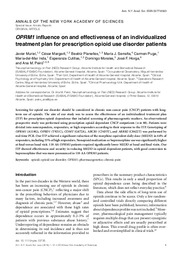Title:
OPRM1 influence on and effectiveness of an individualized treatment plan for prescription opioid use disorder patients |
Authors:
Muriel, Javier 
Margarit, César
Planelles, Beatriz
Serralta, María J.
Puga, Carmen
Inda, María del Mar
Cutillas, Esperanza 
Morales, Domingo 
Horga, José Francisco 
Peiró, Ana  |
Editor:
Wiley |
Department:
Departamentos de la UMH::Farmacología, Pediatría y Química Orgánica |
Issue Date:
2018-08 |
URI:
https://hdl.handle.net/11000/32357 |
Abstract:
Screening for opioid use disorder should be considered in chronic non-cancer pain (CNCP) patients with long-term use of opioids. The aim of our study was to assess the effectiveness of an individualized treatment plan (ITP) for prescription opioid dependence that included screening of pharmacogenetic markers. An observational prospective study was performed using prescription opioid-dependent CNCP outpatients (n = 88). Patients were divided into nonresponders, responders, or high responders according to their response to the ITP. Genotyping of OPRM1 (A118G), OPRD1 (T921C), COMT (G472A), ABCB1 (C3435T), and ARRB2 (C8622T) was performed by real-time PCR. Our ITP achieved a significant reduction of the morphine equivalent daily dose (MEDD) in 64% of responders, including 33% of high responders. Nonopioid medication or buprenorphine use was significantly higher at final versus basal visit. 118-AA OPRM1 patients required significantly lower MEDD at basal and final visits. Our ITP showed effectiveness and security in reducing MEDD in opioid-dependent patients, with good conversion to buprenorphine that was more pronounced in 118-AA OPRM1 patients.
|
Keywords/Subjects:
OPRM1
chronic pain
opioid
opioid use disorder
pharmacogenetics |
Knowledge area:
CDU: Ciencias aplicadas: Medicina: Farmacología. Terapéutica. Toxicología. Radiología |
Type of document:
info:eu-repo/semantics/article |
Access rights:
info:eu-repo/semantics/openAccess |
DOI:
https://doi.org/10.1111/nyas.13735 |
Published in:
Annals of the New York Academy Science. 2018 Aug;1425(1):82-93 |
Aparece en las colecciones:
Artículos - Farmacología, Pediatría y Química Orgánica
|
 La licencia se describe como: Atribución-NonComercial-NoDerivada 4.0 Internacional.
La licencia se describe como: Atribución-NonComercial-NoDerivada 4.0 Internacional.
.png)
